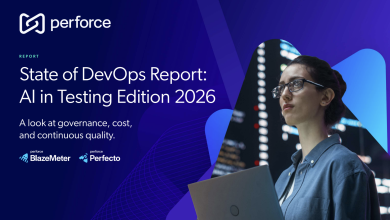
Globalisation is no longer an aspiration; it’s a necessity for companies looking to thrive in a competitive landscape. It helps companies tap into new audiences, diversify their operations, and fuels the next phase of growth. But how do companies successfully unlock their global potential at a time when technological advancements like AI are evolving at a record pace?
Daniel Sanchez-Grant, SVP International & UK Country Director at AlphaSense, an AI-driven market intelligence and search platform, reflects on key learnings following AlphaSense’s expansion into the EMEA and APAC regions and the opening of its London and Singapore hubs.
The decision to go global
Regardless of the country you are physically in, it’s more than likely you are interconnected with others from around the globe. Doing business in more than one market is only getting easier, and is more important than ever to maintain relevancy and growth.
In the AI realm specifically, the online nature of the industry means anyone anywhere can likely use your products. So, it makes sense to have a physical presence in your key customer markets. The UK alone has seen the number of AI companies based here rise by 600% in the last decade, demonstrating just how many companies are looking to tap into this market.
Expanding internationally is also a strategic move for staying relevant in an increasingly competitive market, particularly as the demand for AI solutions grows. By entering new regions, companies can boost brand awareness beyond their domestic borders and tap into emerging markets that are eager to adopt new technologies. This geographical diversification enhances the company’s global footprint and mitigates the risks associated with reliance on a single market. In essence, international expansion provides a dual advantage: it broadens market reach and strengthens resilience against market fluctuations, ensuring sustained growth and stability.
Develop a global strategy with local adaptation
It’s fair to say a ‘one size fits all’ approach to expansion is not going to be effective. Each market operates within distinct cultural, legal and economic environments. To stay ahead of the curve, companies should tailor products, services, and marketing efforts to fit local demands. The benefits are twofold: engaging with diverse markets fosters a culture of innovation and continuous learning, but also strengthens the company’s position against local competitors.
Embracing this principle has helped AlphaSense gain a strong foothold in the markets we’ve recently entered. We’ve done this through many initiatives, such as expanding our local employee base, enhancing our global content database, and forming a number of local strategic partnerships. One partnership that stands out is with Singapore-based global investor EDBI, whose expertise helps us understand the nuances of, and engage with, the local market. Throughout our growth journey, we have continued to gain valuable insights from different regions that we have then leveraged to refine strategies, adapt offerings and drive improvements across our operations.
Build a strong, diverse global team
Once you’ve gained a foothold in a new market, growing a strong local team is the real connective tissue.
A strong team is fundamental to achieving global success, and this begins with appointing on-the-ground regional leaders who possess a deep understanding of the cultural nuances and operational best practices specific to their respective regions. These local leaders play a pivotal role in bridging the gap between global strategies and regional needs, ensuring that business practices are effectively adapted to align with local expectations and standards.
This goes beyond the tick-box exercise of employing individuals from diverse backgrounds – it requires a concerted effort to create an inclusive environment where different perspectives are welcomed and every individual is treated with respect. At AlphaSense, we strive to reflect the global markets we serve, recognising diverse perspectives drive business innovation, which is crucial for success in a rapidly changing global landscape.
Furthermore, on-the-ground executive support is vital for success. Firsthand engagement with local teams and customers enables leaders to grasp the cultural, competitive, and operational nuances that drive market dynamics. This presence builds credibility with partners, strengthens relationships, and ensures the company’s strategic goals are understood and embraced across regions. Moreover, it demonstrates a commitment to the region, inspiring teams and driving alignment with global objectives. Simply put, executive presence is crucial for creating a strong, cohesive global footprint.
Of course, your team must also possess an understanding of the products and services you offer. Something to keep in mind is the demand for people with AI specific skills is growing around the world. PwC found growth in jobs that require AI specialist skills has outpaced all jobs by 3.5x since 2016. Companies are willing to pay too, with jobs that require AI specialist skills carrying up to a 25% wage premium in some markets.
Leverage technology and data
In our interconnected world, businesses must communicate quickly and seamlessly across regions. Relying on traditional phone calls or face-to-face meetings is no longer effective for dispersed teams.
Integrating advanced technology into daily operations facilitates seamless collaboration. Tools like Slack and Microsoft Teams enable real-time communication, while cloud-based platforms such as Google Workspace and Asana facilitate efficient collaboration on projects.
Data-driven decision-making is critical for aligning strategies with real-time market conditions. With AI-powered analytics tools like Tableau or Looker, companies gain valuable insights into market trends, customer behaviours, and competitive dynamics, allowing them to assess win rates by vertical, industry, and region and refine their sales strategies accordingly. For instance, AlphaSense uses its AI-driven platform to analyse and summarise vast datasets of market intelligence. This capability enables teams to quickly identify shifts in industry sentiment and emerging competitor strategies, refining their approach effectively.
In regions with language barriers or cultural nuances, data acts as a universal language. By measuring key metrics, we can identify patterns, track performance, and align global strategies with local execution. This integration of technology and data not only enhances collaboration but also ensures decisions are informed and agile, improving win rates and driving growth.
Communicate the mission
Geographical nuance is core to a global company. As customers and employees become more dispersed across the globe there needs to be connective tissue to ensure cohesion and consistency across regions.
A compelling mission that is communicated effectively serves as the foundation for both internal cohesion and external credibility. This deliberate focus on clarity and purpose not only aligns our global operations but also ensures that every team member, regardless of location, understands and connects with our core objectives. It allows us to cultivate a shared sense of purpose that transcends geographical boundaries. This unity is crucial for inspiring and motivating our workforce, fostering a collaborative environment where team members are driven by a common goal.
Looking ahead
The world’s fastest-growing firms are constantly seeking new growth opportunities, and as companies grow internationally, a physical presence in key markets is essential for forging deeper connections with clients and gaining insights into their needs and challenges. As a leader in AI-driven market intelligence, AlphaSense is positioned to shape the future of the AI industry worldwide – local expertise and diverse global teams are key to this journey. For any business expanding its global footprint, these tactics can set a strong foundation for long-term success.



